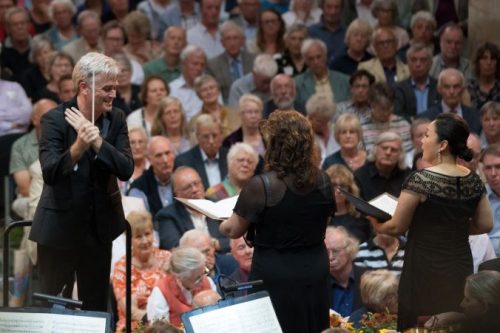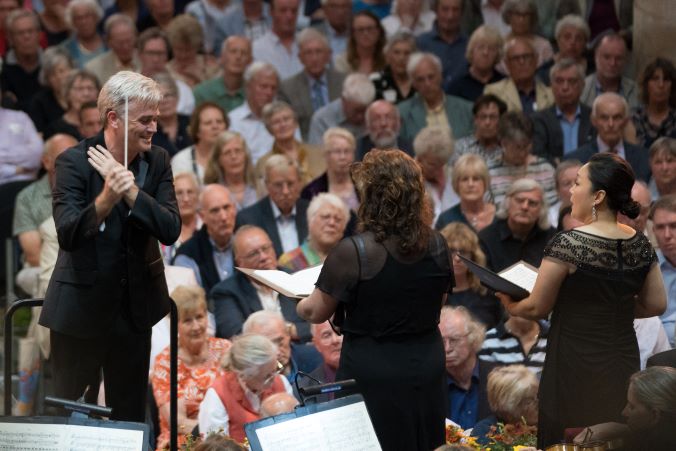
 United Kingdom Three Choirs Festival (3) – Verdi: Hye-Youn Lee (soprano). Christine Rice (mezzo-soprano), David Butt Philip (tenor), James Platt (bass), Three Choirs Festival Chorus, Philharmonia Orchestra / Edward Gardner (conductor). Gloucester Cathedral, 28.7.2019. (JQ)
United Kingdom Three Choirs Festival (3) – Verdi: Hye-Youn Lee (soprano). Christine Rice (mezzo-soprano), David Butt Philip (tenor), James Platt (bass), Three Choirs Festival Chorus, Philharmonia Orchestra / Edward Gardner (conductor). Gloucester Cathedral, 28.7.2019. (JQ)

Verdi – Messa da Requiem
Fresh from – or perhaps despite – their exploits in Berlioz the previous evening, the Three Choirs Festival Chorus and the Philharmonia Orchestra were back in Gloucester Cathedral to perform one of the enduring staples of the choral/orchestral repertoire, the Verdi Requiem.
On the podium was Edward Gardner a regular and welcome guest at Gloucester festivals. He’s no stranger to Gloucester Cathedral: he was born in the city and, in the early 1980s, he sang as a chorister in the cathedral choir in the days of John Sanders. Gardner has established himself as one of the country’s leading conductors, not least through his work as Music Director of English National Opera (2007-2015). Currently, he is Principal Conductor of the Bergen Philharmonic Orchestra (since 2015) and just recently the London Philharmonic Orchestra named him as their next Principal Conductor, in succession to Vladimir Jurowski, effective from the 2021/22 season. On his previous visit to the Gloucester Three Choirs Festivals, Gardner has conducted other large-scale choral/orchestral works. He did Verdi’s Four Sacred Pieces at the 2013 Festival (review) and led an enthralling account of Berlioz’s Grande Messe des Morts three years later (review). Given his significant operatic experience, I’m sure it’s no coincidence that he’s often so successful in works such as these, as well as in the ‘conventional’ symphonic repertoire.
In his programme note, Timothy Symonds justly observed that ‘Musicians and churchmen alike have debated whether this is truly a sacred work or an opera in disguise.’ That reminded me of the celebrated acid put-down by the German conductor, Hans von Bülow who, memorably, caustically – and unfairly – referred to the Verdi Requiem as an ‘opera in ecclesiastical vestments’. As we shall see, tonight’s performance was something of a contribution to that debate.
I think that the background to the composition of the work and the reasons why it came into being demonstrate that Verdi had no intention of writing simply an opera manqué. The Requiem as we know it today was written in tribute to the leading Italian poet and politician, Alessandro Manzoni, who died in 1873. Verdi composed his Requiem over the following months and it was first performed, in Manzoni’s honour, in May 1874. However, the work’s origins lie a few years earlier when Verdi proposed an extraordinary composite musical tribute to Rossini. After Rossini died in 1868, Verdi proposed that thirteen Italian composers should each write a section of the Requiem Mass with the intention that the collaborative work should be performed on the first anniversary of Rossini’s death. Verdi decreed that he himself would contribute the concluding ‘Libera me’. Though the music was duly composed by the composers concerned – none of whom, with the exception of Verdi, are remembered today – the performance plans came to nothing and the music gathered dust in an Italian library. In recent years, this composite score has been unearthed and not only have some performances taken place but a couple of recordings have been issued (review). When he made his own setting of the Requiem, Verdi retained his 1868 ‘Libera me’, though in a revised – and improved – form. I think it’s pretty clear that Verdi was moved, first by the death of Rossini and then that of Manzoni, to write music that was definitely more than an ‘opera in ecclesiastical vestments’. That said, opera was in his blood and it was inevitable that he would compose music that was theatrical in nature, especially when faced with the text of the Mass for the Dead which is pregnant with dramatic possibilities.
In this performance, Edward Gardner brought out vividly the dramatic side of the music. So, for example, the opening of the work was very hushed, albeit with no loss of clarity. The ‘Kyrie’, however, was treated with urgency; this is, after all, a plea for mercy. The ‘Dies Irae’ was suitably fiery; hereabouts, the performance had more than a whiff of brimstone to it. The famous off-beat bass drum strokes were played to terrific effect on a very large drum – truly a gran cassa. The ‘Tuba mirum’ was spectacular. There were no less than four distant trumpeters positioned high up on the organ screen, two at either side. These also reinforced the orchestral trumpets and the full force of the Philharmonia made this an overwhelming moment. Undaunted, the Festival Chorus cut through the orchestral tumult superbly at this point. Thus, the tone was set for the performance. Gardner conducted with urgency throughout and ensured that tension was maintained at all times. That was admirable, but perhaps there was a price to pay. I found the performance thrilling and there was no doubt that Gardner galvanised his forces. What I missed at times was a sense of inwardness such as one experiences from a conductor such as the great Carlo Maria Giulini, still, for me, unsurpassed in this work, especially in his live recordings (review). Had that element been brought out a bit more strongly, it would have been the icing on the cake. As it was, it seemed to me that Gardner’s view of the work leaned towards the operatic rather than the sacred.
There was no doubt that Gardner inspired the Festival Chorus. They showed no signs of tiredness following their exertions of the previous evening; indeed, quite the reverse. Verdi gives his chorus even more to get their teeth into than Berlioz did in La damnation de Faust and the Festival Chorus responded keenly to the challenge. The ‘big moments’ such as the ‘Dies Irae’ and ‘Rex tremendae’ were potent and thrilling, but what impressed me even more were the many examples of wonderfully controlled soft singing. In this regard I think, for example, of the long unaccompanied section with the soprano soloist in the ‘Libera me’ and also of the very opening of the work. I should also commend the chorus for their nimble, joyful singing in the double-choir ‘Sanctus’, which was very well articulated and for the spirited rendition of the fugue in the ‘Libera me’. With two major performances now under their collective belt, I think we can safely say that the 2019 vintage of the Festival Chorus is a fine one.
Among the solo quartet, the ladies did particularly well. Hye-Youn Lee has appeared at previous Three Choirs Festivals: she sang in Mahler’s Eighth Symphony at the close of the 2016 Festival (review) and three years earlier she sang in Coleridge-Taylor’s Hiawatha (review); on both occasions her singing was ear-catching. So it was tonight. In particular, I loved the silvery tone on which she floated ‘Sed signifer’ in the Offertorio. We heard the best of her in the ‘Libera me’. At the start, she and Gardner invested the music with great urgency, the words almost tumbling over each other in the senza misura opening. She sang the ‘Tremens factus’ episode with well controlled intensity and later soared above the unaccompanied chorus beautifully until she reached the goal of top B flat.
Christine Rice was equally fine. She gave us a heartfelt rendition of ‘Liber scriptus’ and a little later on she blended well with her soprano colleague in the ‘Recordare’, once more singing with great expressiveness and lovely, firmly focussed tone. She also contributed most effectively elsewhere, not least when she and her male colleagues have their final place in the sun, the ‘Lux æterna’ trio.
Last year I was a chorus member in a performance of The Dream of Gerontius in Gloucester Cathedral when David Butt Philip sang the title role. I was impressed by his portrayal of Gerontius and I enjoyed his singing again tonight. He blended well with his colleagues in sections such as the ‘Quid sum miser’ and the ‘Lux æterna’. He also made the most of his two main solo opportunities. ‘Ingemisco’ was sung with open-throated expression, the top register thrilling. In the Offertorio other tenors I’ve heard have floated the ‘Hostias’ more sweetly but I liked the controlled intensity that I heard tonight. I don’t think I’ve previously heard James Platt, the bass soloist. He certainly cuts an imposing figure on the platform and he has a big, cavernous voice. However, I was not entirely convinced. In his first solo, ‘Mors stupebit’ it seemed to me that the notes were not hit truly and as a result the pitching seemed somewhat approximate. Thereafter things improved somewhat and I liked his legato singing in a strong account of the ‘Confutatis’ solo, though elsewhere I didn’t think he consistently offered the rock-solid foundation to the quartet that one looks for.
Throughout the performance the Philharmonia played with distinction. The orchestra accompanied the soloists with no little subtlety. There was a great deal of expertly soft playing to admire and the orchestra turned on the power thrillingly at Verdi’s climaxes, yet managing to do so in such a way that they didn’t obliterate the singers.
Edward Gardner is very much the man of the moment, following the announcement of his appointment with the LPO. In the wake of that announcement I read an interview that he gave to The Times newspaper. One passage in particular caught my eye. Asked about BBC Radio 3’s apparent intention to launch a drive to recruit more ‘passionate minds’ as listeners (defined as ‘culturally engaged 35 to 54-year-olds’), Gardner had no truck with the idea. ‘I find that kind of age-group stereotyping incredibly patronising….What is it saying? That the over-54s listen without passion and only want Brahms symphonies? My belief is that if you are bold in your programming, and give absolutely everything you’ve got to your music-making, you will get a passionate response from people of all ages.’ I couldn’t agree more with those sentiments. Many people in tonight’s Three Choirs audience, myself included, will never see 54 again, but there could be no doubt, as the ovation resounded at the end of this concert, that Gardner’s conducting of Verdi’s masterpiece had elicited a strong response from the audience as well as from the performers.
John Quinn
